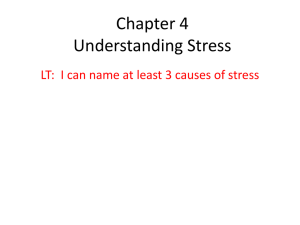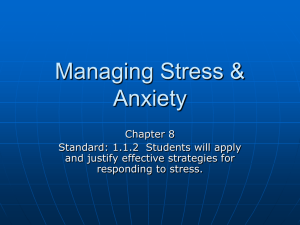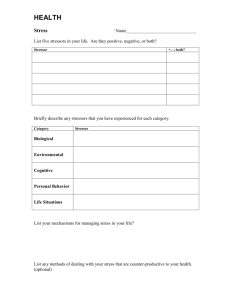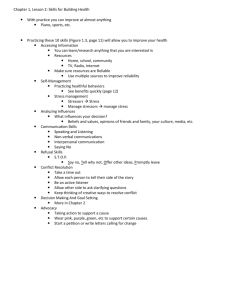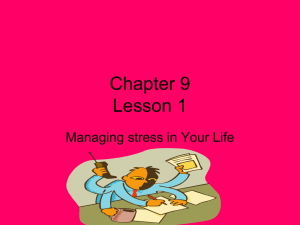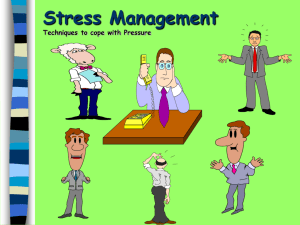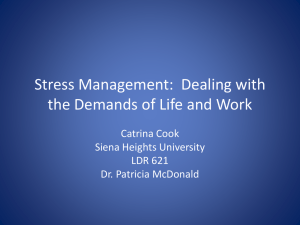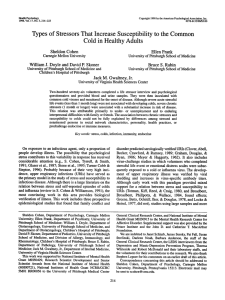Chronic stress
advertisement
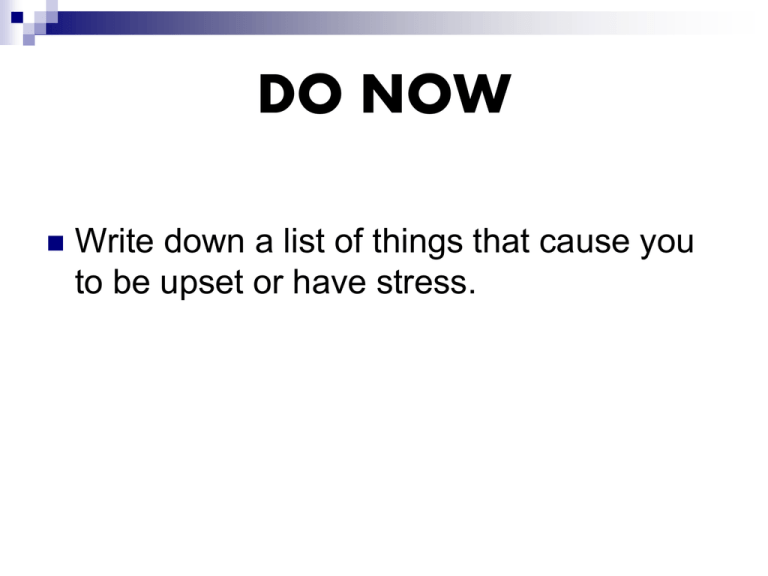
DO NOW Write down a list of things that cause you to be upset or have stress. Managing Stress Objective 1: List personal causes of stress. Objective 2: Apply refusal strategies for avoiding some stressful situations. Objective 3: Discover strategies for managing stress. Objective 4: Develop healthful behaviors that help reduce stress. What is stress? The effect of physical and psychological demands (stressors) on a person Stressor: a demand placed on the body Stressors Two types: 1. Eustress: positive stress 2. Distress: negative stress Chronic or Acute? Chronic stress: Long term stress For example: Workaholics often have chronic stress. Acute stress: Temporary stress For example: The night before a big test you might experience acute stress. Psychologists have identified 5 categories for causing stress: 1. Biological stressors: illnesses, disabilities, or injuries. 2. Environmental stressors: poverty, pollution or natural disasters. 3. Cognitive or thinking stressors: the way you perceive a situation or how it affects you and the world 5 general categories continued… 4. Personal behavior stressors: such as negative reactions in the body and mind caused by using alcohol, tobacco or other drugs or by lack of physical activity. 5. Life situation stressors: death, separation/divorce, or having trouble in relationships with peers. The Body’s Stress Response Three phases: 1. Alarm 2. Resistance 3. Fatigue Alarm Stage Homeostasis: When your body’s systems function smoothly and your mind is at ease. (normal balanced state) In the alarm stage, your body produces adrenaline. “Fight or flight” response Resistance Stage It’s not always possible to fight or take flight from the stressor. The body tries to recover from the stress response but can not return to homeostasis. The body continues to function at a higher level. Fatigue In this stage, your ability to effectively manage other stressors is very low. Both the mind and body have become exhausted. 3 Types Physical Pathological: overworking of the body’s immune and defense systems for fighting disease. Psychological Lesson learned from a Donkey Physical & mental effects of stress may lead to… Chronic headaches Asthma – air way’s constrict High blood pressure (risk for stroke & CAD) Weakened immune system Mood swings & depression Higher risk of substance abuse Ways to take control of stress: 1. 2. 3. 4. 5. 6. 7. Plan ahead Get adequate sleep Get regular physical activity Eat healthy foods and regular meals Limit comfort foods: (sugars and fats) Limit caffeine: will actually increase the physical effects of stress on the body Avoid alcohol, tobacco and drugs Stress management techniques Redirect your energy (work on creative project, exercise, etc) Relax and laugh (deep breathing, thinking pleasant thoughts, stretching, etc) Keep a positive outlook Seek out support Express yourself (learn positive strategies for expressing needs, wants, and feelings. Set goals for you future.) http://www.cnn.com/video/#/video/health/2 011/03/10/hm.stress.buster.cnn?iref=video search Interactive study guide #1 & 2 http://glencoe.mcgrawhill.com/sites/dl/free/0078726549/359991/I nterActCh8Ls1.html http://glencoe.mcgrawhill.com/sites/dl/free/0078726549/359991/I nterActCh8Ls2.html EXIT TICKET Review your list of stressors, next to each one write down how you can manage it.
